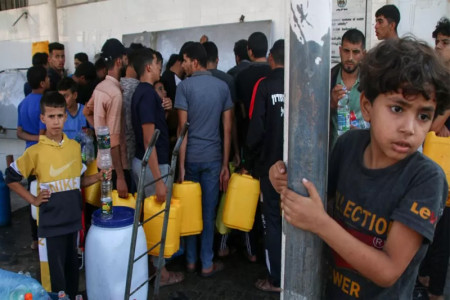And what they found was a city on its knees, ill-prepared for its population to literally double overnight.
Every room, every alley, every street is packed with men, women and the young. And there is nowhere else to go.
Hamas say 400,000 of the 1.1 million people who call northern Gaza home headed south down the Salah al-Din Road in the last 48 hours, following Israel's order to leave.
I was among them, along with my wife and three children, and two days' worth of food.
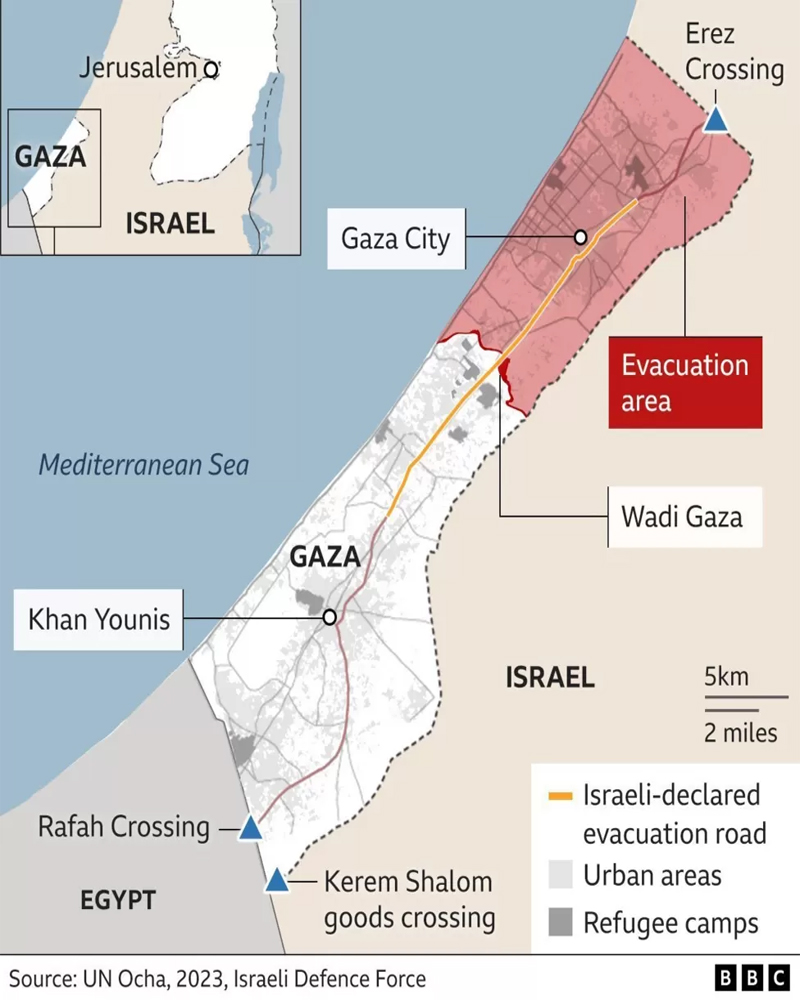
For many, the threat of Israel's bombs and impending invasion - which comes after gunmen from Gaza killed 1,300 in Israel - cancels out Hamas's order to stay put.
But in this narrow strip of land, blockaded on all sides and cut off from the rest of the world, options for where one ends up are limited. Safety is never guaranteed.
And so a teeming mass of Gazans, many already bombed out of their homes, all lost, all afraid, all knowing nothing of what comes next, converged here.
This city, normally home to 400,000 people, has ballooned to more than a million overnight. As well as the north, they have come from the east, which suffered terribly in the 2014 war.
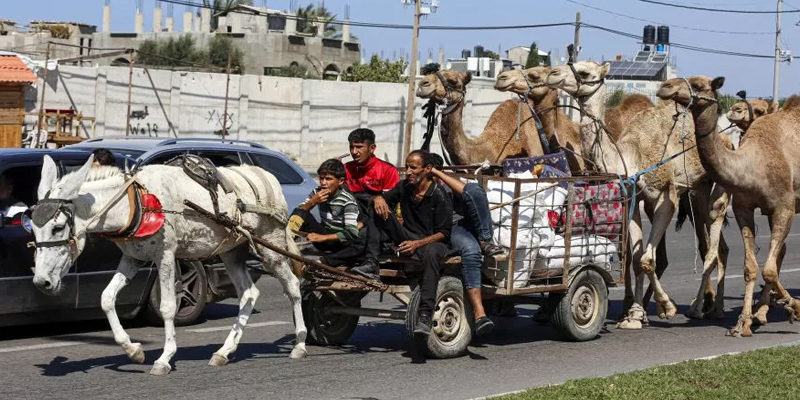 Hundreds of thousands of people have fled north Gaza
Hundreds of thousands of people have fled north Gaza
Every single one of them needs shelter and food, and no one knows for how long.
Things fall apart
Scarce resources are running out, fast. This is a city that was already exhausted. And the tide was too strong, and things are starting to fall apart.
The main hospital here, already low on essentials, has not only taken in sick and injured from the north - it has now become a refuge.
Refugees line the corridors as doctors work on new arrivals injured by Israeli bombs. The din of competing voices fills the air.
You cannot blame people for coming here.
Hospitals are among the safest places to be in a time of war, protected by international law.
By some measures these people are perhaps the lucky ones, at least for now.
Doctors say they have almost nothing to give the stream of new casualties - water is rationed to 300ml a day for patients. Refugees get nothing.
Elsewhere, residents take in new arrivals. Many in Khan Younis lived in cramped conditions to begin with. Now they are cheek by jowl.
I have seen small apartments, which already housed more than they could comfortably hold, becoming "homes" for 50 or 60 people - no one can live like this for long.
My family now shares a home with four others in a flat with two small bedrooms. There are metres of personal space for us. I consider us among the lucky ones.
Schools across the city, also "safe" from war, are filled with a multitude of families - tens of thousands perhaps, but who knows? You'd never stop counting if you began.
At one school, run by UN relief agency UNRWA, every classroom is filled, every balcony space criss-crossed with clothes lines.
Mothers and grandmothers cook on park benches in the courtyard as their hungry children wait impatiently.
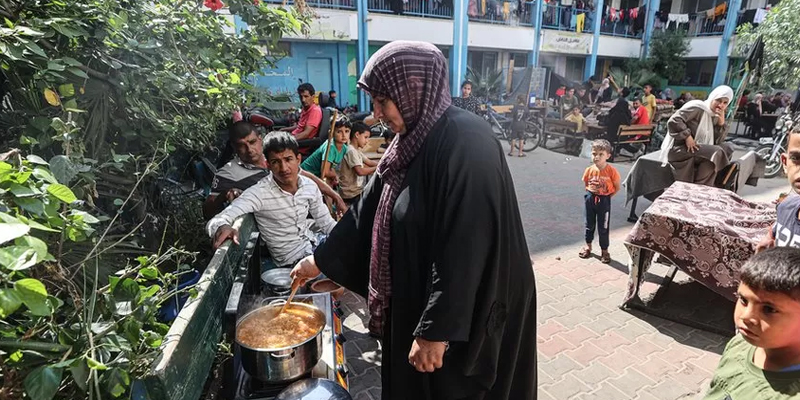 Some of those fleeing northern Gaza have taken shelter at a UN school in Khan Younis
Some of those fleeing northern Gaza have taken shelter at a UN school in Khan Younis
But when there is no more room - and there is no more room - humanity inevitably spills out onto the streets, fills the alleyways and the underpasses, and lives and sleeps in the dirt, the dust, the rubble, waiting for something better that might never arrive.
There's little food, little fuel. There is no water in the shops. Water stations are the best hope. It is a catastrophic situation.
And it is not as if this city is safe from harm. It is regularly bombed - it is still in a warzone. Collapsed buildings and piles of rubble litter the streets.
I heard rocket launches from near the hospital, as Hamas continues to strike inside Israel. That is an open invitation for retaliation.
The hum of Israeli drones looking for their next target is ever present.
And bombs drop, and buildings fall, and the morgues and hospitals fill with more people.
A bomb fell near my family's flat this morning. Because all telephone services are out or severely disrupted, it took me 20 minutes to contact my son.
People cannot live like this. And the invasion has yet to begin.
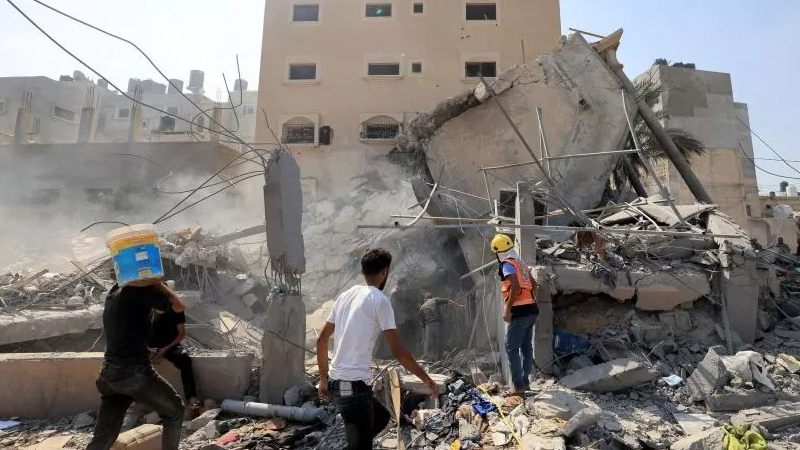 Palestinians pick though a building hit by an Israeli strike in Khan Younis
Palestinians pick though a building hit by an Israeli strike in Khan Younis
I have covered four wars here in Gaza, my home. Never before have I seen it like this.
For however bad the previous wars were, I had never seen people starve or die of thirst in this place. This is now a real possibility.
The only option out of Gaza, the Rafah crossing into Egypt, remains closed. And Cairo knows that to open it would usher in a new humanitarian disaster.
There are now one million Gazan refugees waiting 20km from Rafah. Once the crossing is open, there will be chaos.
I saw the same thing in 2014, when thousands tried to escape the war. This time it would be much, much worse. This is what Egypt fears.
The flood of humanity will simply wash over the border, and it will be catastrophe and chaos again.
By Rushdi Abu Alouf in Khan Younis, Gaza
BBC News


